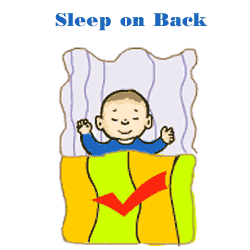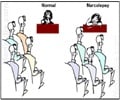Sudden Infant Death Syndrome - Causes
The cause of SIDS remains elusive. However, abnormalities in the brain stem leading to defective
SIDS occurs because of a complex interaction among various factors, which includes the way infants grow, their exposure to environmental
Many of these deaths occur because the baby lies on the stomach. During this, the child continuously "re-breathes" the same air, which is trapped between the face and the crib bedding. This increases the level of carbon dioxide in the blood. Usually, this should signal an arousal response from the brain centers, which is absent in babies prone to SIDS.
Over the years, studies have explored the possibility of a number of possible causes including suffocation, vomiting or choking, birth defects, metabolic abnormalities and infection.
It should be noted that the majority of babies are able to roll onto their tummies by the age of 5 months. Even if they are asleep on their stomach, the increased carbon di oxide level should be able to generate a normal stimuli, making the baby turn.
A 2006 study found that infants who die of SIDS have abnormalities in the part of the brain that helps to control breathing and arousal.
Abnormalities in the brain stem appear to affect the ability to use and recycle serotonin - a chemical that is responsible for regulating mood as well as vital body functions.
A normal baby will wake up, turn over, and begin to breath faster when carbon dioxide levels rise. But in babies who are victims of SIDS, a defective serotonin system could impair these reflexes.
There are many factors that increase the risk of making an infant prone to SIDS. Listed below are some of these factors that have been implicated
Prenatal Risks (when the baby is in the mother’s womb)
- Insufficient prenatal care and nutrition.
- Maternal smoking/ drug habits.
- Alcohol abuse.
- Teenage pregnancy.
- Lesser than one year interval between births.
Postnatal risks (after birth of the baby)
- Low birth weight (less than 1.5 kg).
- Being exposed to tobacco smoke.
- Laying infants to sleep on their stomach.
- Failure to breast-feed.
- Overheating, possibly due to excess clothing .
- Soft or excess bedding.
- Stuffed toys.
Lowering the Risk of Sudden Unexpected Death in Infants (SUDI)
A few easy childcare habits can significantly reduce your baby’s risk of SUDI:
Crib Mattresses and SIDS – A Possible Relationship
There is some evidence that crib mattresses made of Polyvinyl Chloride (PVC) can cause SIDS. The polyvinyl chloride contains chemical compounds composed of
















